January 2024
The Port of Seattle strives to be a leader in environmentally responsible port operations. It has adopted many environmental initiatives, including offshore wind, hydrogen power production, decarbonizing maritime operations, sustainable aviation fuel, responsible tourism, and habitat restoration. This research focuses on the workforce impact of these environmental initiatives, exploring expected employment impacts, needed occupations and skills, and effects on frontline communities. Visit the report website: https://work-force-impact.com/ or download the PDF version here (with appendices here).
January 2023
This joint report from SJI and The Nature Conservancy focuses on the workforce ecosystem involved in the Green Stormwater Infrastructure (GSI) sector. The project also includes an interactive dashboard to explore these pathways. It was commissioned by the Green Stormwater Infrastructure Workforce Collaborative, which promotes knowledge sharing and collaborates to create opportunities to develop sustainable, equitable, and inclusive career and employment opportunities within the GSI field for the southern portion of the Salish Sea Region. View the webinar presentation slides for this report here.
Port of Seattle Career Pathways: Green Jobs
September 2022
This report provides a labor market analysis of Port-related industries to help identify in-demand career pathways in maritime and green jobs offering a living wage to workers. View the presentation slides for this report here.
King County Green Jobs Strategy – Green Sector and Occupations
June 2022
SJI was hired to support and inform King County’s green jobs strategy. The SJI Policy Research and Evaluation team worked on the following tasks in collaboration with King County Green Jobs Program: Identify prospective high-growth green sectors, including localized industry sector/market opportunity and workforce trends analysis; assessment of high-demand occupations within identified high-growth industries; and recommendations for integration of industry/market sector analysis and occupational assessments into King County’s Green Jobs Strategy development process. Watch the webinar presentation of this report’s findings here.
Clean Energy in the Bonneville Power Administration Area
June 2021
This report is a scan of the landscape of the current and future workforce needed by utilities to achieve Washington state’s clean energy goals.
Seattle’s Energy Efficient Building Operations and Construction Industries Workforce Report
2021
This research provides an overview of the most relevant occupations in the sustainable Construction and Building Operations sectors and the different training programs (college and non-college based) available for each occupation.
Digital Bridge Pilot Project Report
2021
Digital Bridge was a challenging but successful pilot program. All partners are using the launch experience to improve service delivery. The work of Digital Bridge is continuing with additional funding. The report authors’ intent is that this evaluation serves to inform scaling, improvements, and the development of similar programs and the policies and investment necessary to deliver quality, effective programs for un- and underemployed job seekers on their career and digital opportunity pathways
Ramping Up Medical Assistants in the COVID-19 Recovery: A Case for Registered Apprenticeships
2021
This report presents evidence that apprenticeship programs could strongly benefit healthcare providers thanks to a strong return on investment. The report first describes the regional labor market for medical assistants before and after the COVID-19 pandemic by enumerating the demand- and supply-driving factors. It also estimates the return on investment of setting up an MA apprenticeship program using labor market data from EMSI, the Oregon Apprenticeship Calculator, and information from the Washington State Department of Labor & Industries. It then reviews the barriers preventing employers from setting up apprenticeship programs and highlights some recommendations and available grants to address these barriers.
Digitalization & Automation in the Construction Trades
2020
In this paper, we explore the implications of the digital skill gap, the introduction of automation, and the Network Economy for the construction workforce. This analysis looks at construction employment as a whole in metropolitan Seattle, including residential, commercial, industrial, and heavy civil construction.
Adapting to the COVID-19 Environment (COVID Recession & Recovery Brief #2)
2020
This research assesses the capacity of the Seattle/King County workforce system to support those in the most vulnerable position during the crisis and its aftermath to re-enter the labor market. This second brief in the COVID-Recession & Recovery series offers some guidance for how organizations and the system can successfully respond to the COVID-19 unemployment crisis.
COVID-19 and the Future of Work
2020
This paper explores the Network Economy and its implications for the workforce and serves as a guide for policymakers who aim to build a more equitable and inclusive economy. More immediately, it can help inform
economic recovery workforce policies to ensure residents are prepared for these economic shifts and are connected to jobs in the future. Finally, while this research and analysis are focused on the Seattle area, the reader will find similar economic shifts occurring in other communities with attendant implications for the local workforce.
COVID-Recession & Recovery
2020
In this brief, we focused on outlining the worker, occupations, and industries most impacted by the COVID-19 shutdown and subsequent recession. With so much to cover in this quickly evolving landscape, we will be publishing a three-part series done by SJI on behalf of the City of Seattle’s Office of Economic Development to inform the City strategies as it collaborates with the Workforce Development Council to plan our regional recovery from this unprecedented economic shutdown and recession.
Beyond the Headlines: Digital Literacy
2020
Over the last 20 years, the use of information communication technology has increased in virtually all jobs. This digitalization of the workplace means that even the most basic work functions require some level of digital literacy.
Evaluation of the Ironworkers Pre-Apprenticeship Program
2020
Seattle Jobs Initiative provides career navigation and wrap-around support services to those Ironworkers Pre-Apprenticeship program participants who qualify for SJI services. The goal is to help SJI’s target populations to attain living-wage careers. The 4-week program offers a path to a well-paying field: upon successful completion of the Pre-Apprenticeship, the participants can continue to a four-year-long Apprenticeship program, where participants start with an hourly wage of $25.41 and receive a pay raise every six months. At the end of the Apprenticeship, as Journeymen, the participants earn $42.35/hour.
About Our Work
The Policy Research and Evaluation Team at SJI conducts and publishes research in two major areas: Labor Market Opportunity and College Attainment & Career Pathways.
Labor Market Opportunity
Our labor market research is primarily focused on identifying job opportunities that are accessible to individuals who have less than a college degree. This information is used to inform local colleges and training providers as well as SJI programs. A secondary focus of research in this area is to understand the change in living wage over time, skill requirements to remain competitive in the local labor market, and identifying the availability of training. We also provide knowledge to the community and community partners on specific sectors of the labor market. As a part of this work, SJI released a comprehensive report in January 2018, Big Picture: Changing Poverty and Employment Outcomes, which analyzed changes in poverty conditions and employment outcomes by zip code.
College Attainment & Career Pathways
This research seeks to provide a better understanding of the challenges of college attainment and to identify and provide solutions to barriers that low-income and low-skill individuals face in preparing for, accessing, and completing community college programs. Additionally, it highlights promising practices that are focused on these issues and improving outcomes. SJI has recently been focused on understanding issues that focus on the whole person such as housing stabilization, transportation, childcare, mental health, and more.
General Policy Research

In addition to these major areas of focus, SJI also conducts a variety of general policy research related to our work, including workforce development best practices and systems-building, funding for employment and training, local demographics (relevant to employment and educational attainment of the local low-income population), and policy issues. This includes SJI’s extensive research on how to better understand benefits cliffs to help Washingtonians advance to self-sufficiency through workforce strategies.
SJI produced a quarterly publication called Beyond the Headlines which provided the community with an understanding of local issues and how they connect to the national conversation. Previous issues have included information on digital literacy, changes in the Seattle living wage, and a look at the demographics of opportunity youth in the Seattle area.
